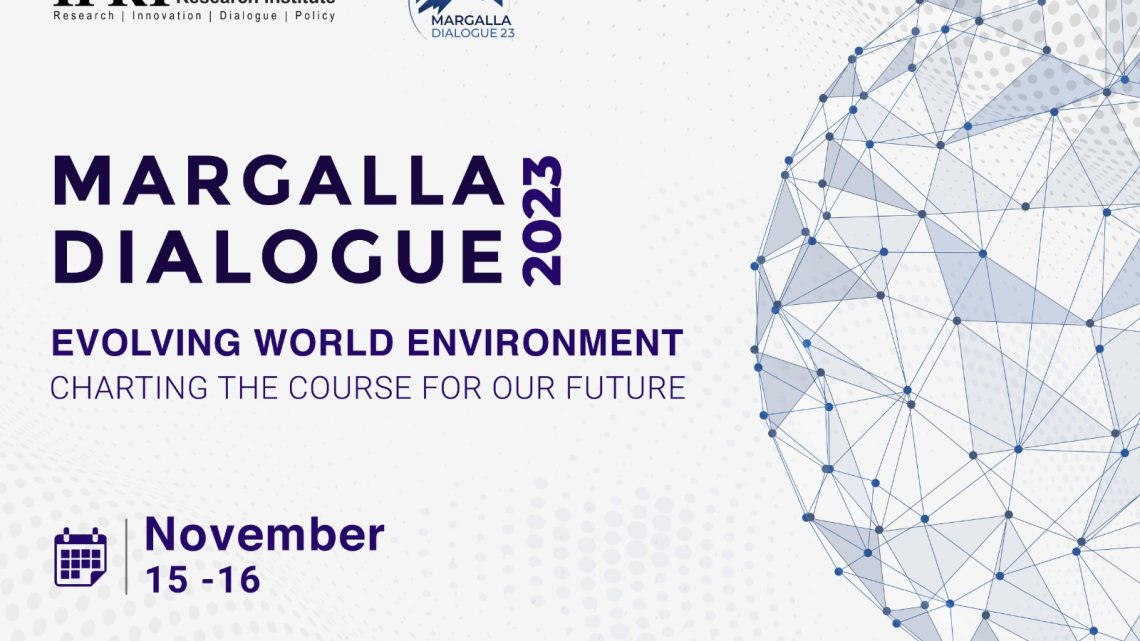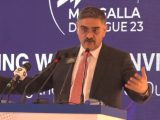
Margalla Dialogue: Perspectives from Pakistan’s Leadership
November 15, 2023Addressing the Margalla Dialogue, 2023, both President Dr. Arif Alvi and Prime Minister Anwarul Haq Kakar of Pakistan offered insightful reflections on the internal and external challenges shaping the nation’s trajectory. Their speeches, delivered at the Margalla Dialogue and in a special address, respectively, shed light on issues ranging from global geopolitics to regional security concerns.
President Alvi commenced the Margalla Dialogue by delving into the annals of human and state-centric history. He painted a vivid picture of a past marred by lawlessness, wars, and the manipulation of religion and politics. The theme, “Evolving World Environment: Chartering the Course for Our Future,” set the stage for an exploration of the contemporary challenges facing the world.
One major concern highlighted by President Alvi was the omnipresence of Artificial Intelligence (AI) and its implications. He cautioned that AI poses both direct and indirect threats, encroaching into various aspects of life. The changing world environment, he argued, is now impacting state policies in ways beyond the control of governments.
Rampant poverty, a consequence, in part, of budgetary allocations to wars, was another focus of President Alvi’s discourse. He underscored the need to redirect resources towards human development, emphasizing mental health, narrative building, and the pursuit of societal happiness as crucial factors in shaping the modern world.
Despite the challenges, President Alvi remained optimistic about the potential for positive evolution. He expressed faith in democracy anchored in humanity, ethics, and sound reasoning as a catalyst for a better global entity. Drawing on historical references, he highlighted the evolution of societal norms, especially the Westphalian Treaty of 1648, as a milestone in establishing decency in state affairs.
A poignant call to action emerged as President Alvi urged nations to work against wars, hate, and bias. He advocated for the United Nations to play a cardinal role in fostering peace and a just society, grounded in the values of emancipation and humanity.
In addition, Prime Minister Anwarul Haq Kakar’s address provided a comprehensive analysis of Pakistan’s internal and external dynamics. He identified key threats to national security, including the lax implementation of the rule of law, weak governance, proxy warfare, economic challenges, and insufficient attention to human security.
PM Kakar stressed the importance of national resolve, socio-economic justice, political stability, and good governance as essential elements for strengthening social cohesion and economic resilience. In recognizing the era of multilateralism, he acknowledged India’s rise as an economic power in the region and called for institutionalized peace and resolution of issues like the Kashmir dispute.
The Prime Minister delved into the complexities of global geopolitics, highlighting new regional security alliances such as QUAD and the Indo-Pacific Strategy. He expressed concern about India’s attempts to contain China through alliances in the Western hemisphere, emphasizing that the present-day competition is more economic than strategic.
Prime Minister Kakar extended an olive branch, stating that Pakistan does not incentivize conflict like India and called for a regional order promoting connectivity. He urged India to be part of this order, dispelling the notion of issues between Pakistan, Indo-China relations, and growing ties with the United States.
On the issue of Kashmir, PM Kakar reiterated the importance of allowing the Kashmiri people to decide their future. He rejected the imposition of solutions by either Pakistan or India and highlighted Kashmir as an impediment to bilateral relations.
Addressing the western borders with Afghanistan, Kakar expressed optimism that stability would ensue with a legitimate government in Kabul. He touched upon trade and commerce, asserting the need for a balanced approach that considers Pakistan’s economic interests.
PM Kakar also addressed the politics of Hindutva, clarifying that Pakistan harbors no issues with the Hindu religion and praising the significant contributions of the Hindu community to the nation.
In concluding his address, Prime Minister Kakar accepted the security threat posed by non-state actors, defended the policy to expel illegal Afghan nationals, and advocated for a balanced foreign policy that takes tangible considerations from both China and the United States.
The speeches by President Alvi and Prime Minister Kakar collectively underscore the complexities and nuances inherent in Pakistan’s contemporary challenges. From the impact of AI and evolving global environments to regional geopolitics and internal strife, these addresses provide a comprehensive understanding of Pakistan’s perspectives on the path forward. As the nation grapples with multifaceted challenges, the calls for international cooperation, dialogue, and a nuanced approach to complex issues remain at the forefront of Pakistan’s strategic vision.

